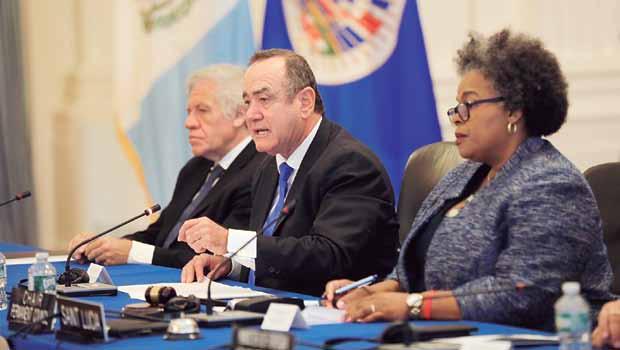
2 minute read
Guatemala fortalece resiliencia en Corredor Seco
Rodrigo Pérez DCA Mundo
Advertisement
El Gobierno de Guatemala y la Organización de las Naciones Unidas (ONU) lanzaron en Chiquimula un programa para fortalecer la seguridad hídrica y alimentaria de las familias que viven en el Corredor Seco, el cual alcanzará a 7 mil hogares de 7 municipios del departamento aludido y de Jalapa.
El plan tendrá una duración de cuatro años e incluye acciones en siete microcuencas de Camotán, Olopa, San Juan La Ermita y Chiquimula, así como San Pedro Pinula y San Luis Jilotepeque, Jalapa. La inversión estimada es de US $8.8 millones (Q61.8 millones), que será financiada por el Gobierno de Suecia.
“Este proyecto se alinea con la Política General de Gobierno y el Plan Nacional de Desarrollo. Persigue un cambio de comportamiento, fortalecer las capacidades y garantizar la seguridad alimentaria de la población vulnerable”, dijo José Ángel López, titular del Ministerio de Agricultura, Ganadería y Alimentación (MAGA).
Objetivos
La estrategia conjunta persigue “la mejora de la seguridad alimentaria y nutricional, resiliencia de las familias a través de la adaptación de sus sistemas alimentarios a la sequía. Además, el fortalecimiento de sus conocimientos agropecuarios, actitudes y prácticas nutricionales y sobre salud, fomentando la igualdad de género”, explicó Naciones Unidas.
También busca que las familias y organizaciones comunitarias y municipales cuenten con mejor infraestructura gris y verde para la gestión del agua y el fortalecimiento de las capacidades de funcionarios de los gobiernos central y local.

Fotos/Photos: Archivo
Rodrigo Pérez DCA Mundo
The Government of Guatemala and the United Nations (UN) launched in Chiquimula a program to strengthen the water and food security for families living in the Dry Corridor. It will reach seven thousand households in seven municipalities of this department and the department of Jalapa.
The plan will run for four years and includes actions in seven micro-watersheds in Camotán, Olopa, San Juan La Ermita, and Chiquimula, as well as San Pedro Pinula and San Luis Jilotepeque in Jalapa.
The estimated investment is USD 8.8 million (GTQ 61.8 million), to be financed by the Government of Sweden.
“This project complies with the General Government Policy and the National Development Plan. It seeks to change behavior, strengthen capacities, and guarantee food security for the vulnerable population,” said José Ángel López, head of the Ministry of Agriculture, Livestock, and Food (MAGA).
Goals
The joint strategy aims to “improve families’ food and nutritional security and resilience through adapting their food systems to drought. In addition, to strengthen their agricultural knowledge, attitudes and nutritional and health practices, promoting gender equality,” explained the United Nations.
It also seeks to provide families and community and municipal organizations with better gray and green infrastructure for water management and to strengthen the capacities of central and local government officials.



